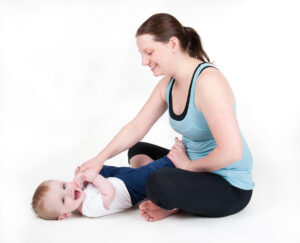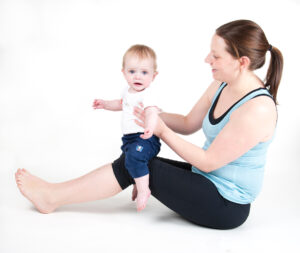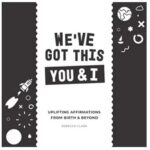How to play with your baby
Antenatal Education: How to play with your baby
 So, your baby has arrived and you are sent home from the hospital, now what? What do you do all day with your baby?
So, your baby has arrived and you are sent home from the hospital, now what? What do you do all day with your baby?
While the early weeks will be filled with feeding, changing nappies and naps, over time your baby will be awake for longer and longer each day. When they are awake and alert, this is a great time for you to play.
Playing together is a great way for you and your baby to get to know each other and is essential for their overall development. Through play and new experiences your baby learns about the world around them, helps them to build strength and help parts of your newborn’s brain connect and grow. Your baby will learn through playing and repeating movements over and over again. They develop motor skill, communication and social skills.
But it’s an important time for you too – playtime can help you learn what baby likes and what type of personality they have.
Take your time
Take note of a regular time in the day when baby is awake and happy – likely a short time after a feed – and set this time aside each day to play with your baby. It might only be for a few minutes while they are new-born, but as they grow, so will the amount of time they are awake.
Go down on to the floor with your baby onto a play mat or blanket and lay down. You can use toys or safe objects to look at, feel and talk about. Use different colours and textures to stimulate your baby and help them to learn about the world around them.
Communication
There are many ways you can communicate with your baby – through your voice, your touch and eye contact.
Talking to your baby helps them to learn new sounds and understand words, so talk to them as you are playing. If they make a sound repeat it back to them and in time, they will understand the words you are repeating to them. Talk to them about what colours or pictures you are looking at, use a range of words to tell them about your day or what your favourite toy was.
You can also touch your baby in a safe gentle way while you are playing together to give reassurance. Touch helps to build brain development, soothes baby and helps you and baby understand each other better.
Eye contact is also a good way to build trust between you and baby. Look at them as you play and talk. It also helps to build the bond with baby as you get to know each other.

Mix it up
As baby grows stronger and more active, it’s important to introduce a range of activities and challenges to keep them stimulated and engaged. A variety of small activities each day can help them to build the gross and fine motor skills which they will use as they get older.
Keep stimulating your baby by showing them new situations, sights, sounds and smells. Going outside feels different on their skin as its cool or warm. There will be trees and sounds from traffic that will be new to baby and help them to become comfortable in the world around them.
Some ideas to keep in interesting, for you and for baby:
- Place toys out of reach in the air or in front of them so they have to stretch and move to get them. This helps to improve their hand eye coordination and fine motor skills.
- Once baby is crawling, set up an obstacle course of cushions for them to crawl over, this builds strength and confidence. Why not do it with them and have fun giggling and crawling!
- Read a book, magazine or recipe as you cook in a different room or chair – changing the type of things you read and the place helps to keep it interesting.
- Try baby classes such as baby yoga, rhyme time or swimming – all great ways to spend time with your baby and build new skills.
- Put music on in the house for you both to sing and dance together. While you are folding laundry or doing simple tasks, this can help to keep baby calm and also stimulated while you do other tasks. When you move you also release oxytocin and feel good!
- If your baby or toddler if full of energy, give them a daytime bath. Let them play with toys in the bath, splash and move about to burn off some energy.
 I love this book!! Its for mums and babies. Its only £5.99 on Amazon. And it’s written and illustrated by an amazing Macclesfield mummy Bex.
I love this book!! Its for mums and babies. Its only £5.99 on Amazon. And it’s written and illustrated by an amazing Macclesfield mummy Bex.
Let them lead
Follow baby’s lead with what and how they want to play – this way they will stay calm and engaged. Let them play with an object for as long as they want to. Babies will often explore new things with their mouths by tasting it. As long as it’s safe object or toy, let them lead the play as often this will bring them comfort if they are teething.
Two to four minutes of play at a time maybe enough for a newborn baby as their body can get tired from playing and learning quickly. They need time to process the new sounds and experiences so they may sleep or rest for longer than normal after a good positive playtime.
If they start to look away, are rubbing their eyes, crying or showing signs of being tired then take their cue that it’s time to rest. You will know your baby’s signs of when they have had enough, so let them lead the way.
No matter what you choose to do, keep it light and fun and simple.
Join me for some playtime in my baby yoga classes. Weekly online classes for babies aged 6 weeks to crawling.


